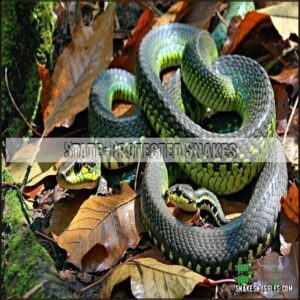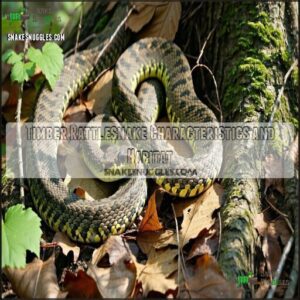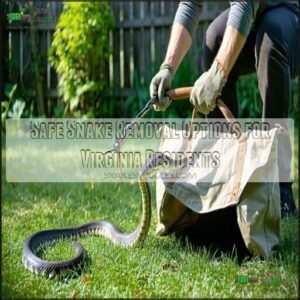This site is supported by our readers. We may earn a commission, at no cost to you, if you purchase through links.
 In Virginia, it’s generally illegal to kill snakes, as many species are protected by state and federal laws.
In Virginia, it’s generally illegal to kill snakes, as many species are protected by state and federal laws.
However, there’s an exception if a snake poses an immediate threat to your safety. For example, stumbling upon a copperhead in your backyard might make you jump, but killing it without a valid reason could lead to legal trouble.
Protected or endangered species, like the timber rattlesnake in some areas, come with even stricter rules. Violators face fines and penalties, so it’s smart to know the laws before acting.
Need tips on safer ways to handle snakes? Stick around for helpful advice.
Table Of Contents
- Key Takeaways
- Legality of Killing Snakes in Virginia
- Protected Snake Species in Virginia
- Identifying Venomous Snakes in Virginia
- Consequences of Illegally Killing Snakes in Virginia
- Safe Snake Removal Options for Virginia Residents
- Frequently Asked Questions (FAQs)
- Is it illegal to kill snakes in Virginia?
- Can You Kill a snake in Old Dominion Virginia?
- Is it illegal to kill a snake?
- Are there venomous snakes in Virginia?
- Are rat snakes illegal in Virginia?
- Is it illegal to kill snakes in Rhode Island?
- Are There Any Exceptions to the Law for Killing Snakes in Virginia?
- Are There Any Protected Snake Species in Virginia?
- What Kind of License Do I Need to Kill Snakes in Virginia?
- Are There Any Penalties for Killing Endangered Snakes in Virginia?
- Conclusion
Key Takeaways
- Killing snakes in Virginia is illegal unless they’re an immediate threat to people, pets, or livestock.
- Most native snakes, including non-venomous ones, are protected by state laws to preserve ecosystems.
- Penalties for killing endangered species, like the timber rattlesnake, include fines up to $50,000 and possible jail time.
- Safer options include professional snake removal services or using deterrents like repellents and habitat modifications.
Legality of Killing Snakes in Virginia
In Virginia, killing snakes is illegal in most cases, as they’re protected non-game species by state law.
Killing snakes in Virginia is mostly illegal—these protected species are vital for pest control and ecosystem balance.
However, exceptions exist if a snake poses an immediate threat to people, pets, or livestock.
General Prohibition on Killing Snakes
In Virginia, snake laws put protections in place to prevent unnecessary harm to these misunderstood animals.
Under the snake killing ban, it’s illegal to kill snakes unless there’s a clear justification. All 30 native species are safeguarded, thanks to their critical role in nature.
Here’s what the law covers:
- A strict prohibition on killing snakes without valid justification.
- Legal protection for non-venomous and venomous species alike.
- Acknowledgment of snakes’ role in natural conservation efforts, controlling pests like rodents.
- Penalties, including fines for killing snakes, even on private land.
Rattlesnakes, for example, play a vital role in controlling rodent populations.
So, while they might slither into your yard, remember—they’re nature’s exterminators, not your enemies.
Exceptions for Immediate Threats
Sometimes, snakes can cross the line from pesky to dangerous. Under snake laws in Virginia, you can act if there’s clear and immediate danger to human safety, livestock, or pets.
Snakes may be pests, but only act if they pose a real and immediate danger to people, pets, or livestock.
Legal exceptions for killing snakes apply when they’re threatening your property directly—like slithering too close to the henhouse or acting aggressively in your yard.
Remember, this self-defense rule demands honest judgment, to ensure the snake presents a real risk, not just a spooky appearance, to stay on the right side of the law.
Penalties for Illegal Snake Killing
Facing snake killing penalties in Virginia can hit harder than you think.
Snake laws in Virginia are strict, with serious consequences for illegal actions.
- Legal Penalties: Virginia Code outlines fines up to $500 for non-protected snakes. Endangered fines skyrocket, paired with one-year prison risks.
- Ecosystem Disruption: Harmful snake killing disrupts natural pest control, upsetting local balance.
- Federal Protections: Killing federally protected species triggers severe, costly fines.
Safeguard yourself—understand these laws, respect snake habitats, and explore legal defenses if needed.
Protected Snake Species in Virginia
Virginia protects many snake species under state and federal laws, which means harming them can lead to legal trouble.
Learning which snakes are protected helps you stay compliant while respecting their role in the environment.
Federally Protected Snakes
Under the Endangered Species Act (ESA), certain snake species in Virginia receive federal protection, making it illegal to harm them.
This law safeguards these species through the ESA’s listing process, which identifies threatened or endangered snakes, and by designating critical habitats important for their survival.
Federal agencies work together under recovery plans to help these species thrive again.
Breaking these protections isn’t just morally wrong—it carries hefty legal consequences.
You could face fines up to $50,000 or even jail time.
The federal enforcement guarantees these rules are upheld across state lines, so even if a protected snake ends up in your yard, it’s not yours to kill.
Instead, let recovery efforts do their work and call professionals for help.
State-Protected Snakes
Virginia snake laws protect several species essential to the state’s ecosystems. The Canebrake Rattlesnake, listed as State Endangered, is strictly off-limits—harming, collecting, or possessing one requires a permit.
Snake laws in Virginia also shield other harmless species important for Habitat Preservation, like the Eastern Mudsnake and Common Rainbow Snake.
Killing snakes’ legality centers on immediate danger. Since all 32 native species are classified as non-game, harming them is illegal unless they pose a direct threat. Instead, focus on Conservation Efforts to protect declining populations.
Here’s why these protections matter:
- Maintain a balance in rodent populations.
- Prevent habitat degradation.
- Support Breeding Programs.
- Foster Population Monitoring for scientific research.
- Aid Reintroduction Strategies for endangered species.
Endangered Snake Species
Endangered snakes in Virginia face an uphill battle for survival, with strong legal protections under the Endangered Species Act (ESA).
These rare, protected snake species suffer most from habitat loss and human activities. Consider the following:
- Wetlands shrinking, leaving snakes without homes.
- Forests fragmenting, breaking their natural hunting paths.
- Polluted rivers poisoning their food sources.
Conservation efforts aim to preserve genetic diversity and boost numbers through reintroduction programs. It’s strictly illegal to harm these snakes under Virginia snake laws, with penalties reaching $50,000. So, think twice—conservation is key!
Identifying Venomous Snakes in Virginia
You’ll find three venomous snake species in Virginia: copperheads, cottonmouths, and timber rattlesnakes. Knowing how to identify them can keep you safe and help protect non-venomous snakes from harm.
Timber Rattlesnake Characteristics and Habitat
The Timber Rattlesnake is a fascinating snake species in Virginia, thriving in mountain habitats.
Its tan-and-yellow body with dark camouflage patterns blends perfectly with forest floors.
This venomous snake’s tail rattles act as a built-in alarm system.
Despite their venom potency, they shy away from people, targeting small mammals instead.
Efforts to maintain their conservation status protect these essential predators.
| Feature | Description |
|---|---|
| Habitat | Mountain regions in Virginia |
| Camouflage Patterns | Tan with dark bands |
| Venom Potency | Highly venomous, but shy |
| Role in Ecosystem | Controls small mammal pests |
Copperhead Identification and Behavior
Copperheads are one of the most recognizable venomous snakes in Virginia, thanks to their copper hourglass markings on a light brown or pinkish body.
These snakes love leafy forest floors, rocky outcrops, and wooded areas.
Want to identify one up close? Here’s what to watch for:
- Juveniles: Bright yellow tails and higher aggression.
- Diet: Mice, frogs, and small mammals.
- Heat-sensing pits: Between their eyes and nostrils for hunting prey.
- Temperament: Typically shy but will defend themselves.
- Habitat: Forested areas with camouflage-friendly coverage.
Cottonmouth Appearance and Preferred Environments
Cottonmouths, one of Virginia’s venomous snakes, are a must-know for safe snake identification.
Their dark green or black coloration stands out, especially in the aquatic habitats they call home, like southeastern rivers, swamps, and lakes.
Juvenile cottonmouths sport bright tail markings, helpful for spotting them.
Known for their defensive behaviors, these snakes open their mouths wide, revealing a white "cottony" interior when threatened.
Watch for them basking on logs or shorelines—true masters of the water!
Their diet includes fish, amphibians, and small mammals.
In Virginia, killing these snakes is illegal unless they pose an immediate threat to life or livestock.
They also possess heat-sensing pits, which aid in locating prey.
Non-venomous Snakes Commonly Mistaken as Dangerous
Nonvenomous snakes in Virginia often pay the price for mistaken identities.
Snake identification guides can prevent unnecessary harm to these harmless look-alikes.
Here are three common misidentifications:
- Eastern Ratsnakes vibrate their tails, mimicking rattlesnakes.
- Northern Watersnakes, often near water, are mistaken for Cottonmouths.
- Eastern Hognose snakes flatten their heads and hiss defensively.
Respect snake killing legality by learning behavior analysis and recognizing snake species Virginia laws protect.
Consequences of Illegally Killing Snakes in Virginia
If you kill a snake illegally in Virginia, you could face steep fines or even harsher penalties. Understanding the law protects your wallet and keeps you out of trouble.
Fines for Killing Non-protected Snakes
Killing non-protected snakes in Virginia can still land you a fine, ranging from $100 to $500.
Snake killing legality depends on proof of an immediate threat, like danger to your family or livestock. Misjudging the situation, though, won’t excuse you.
Virginia’s state regulations focus on protecting these creatures, even the harmless ones. State laws often vary, so understanding local ordinances is key.
When unsure, reporting violations or calling wildlife authorities is your safest bet. It beats risking hefty snake killing fines! Repeat offenses? They’ll cost you even more, so think twice before acting impulsively, to avoid risky and costly mistakes.
Penalties for Harming Endangered Snake Species
After fines for non-protected snakes, stepping on the wrong side of snake laws in Virginia brings much harsher consequences when endangered species are harmed.
Federal penalties under the Endangered Species Act (ESA) are no joke:
- Fines can hit a staggering $50,000 for violations.
- A year in prison isn’t off the table.
- State protections classify violations as Class 1 misdemeanors.
- Unauthorized actions like taking, selling, or transporting these snakes count as ESA violations.
Habitat destruction threatens their survival, amplifying conservation efforts to safeguard biodiversity.
These snakes aren’t just survivors—they’re pest control pros. So, think before acting—legal consequences aside, they’re part of keeping your backyard ecosystem running smoothly!
Impact on Local Ecosystems
Snakes play a pivotal role in keeping Virginia’s ecosystems healthy.
They control rodent populations, preventing habitat disruption and biodiversity loss. Without snakes, the food web can spiral out of balance, leading to overpopulation of prey species and environmental strain.
Here’s why snakes matter:
| Benefit | Result | Impact |
|---|---|---|
| Rodent Control | Fewer pests damage crops | Healthier environments |
| Predation Balance | Stable food web | Protected species coexist |
| Biodiversity Defender | Preserves species interdependence | Sustained ecosystem balance |
Following snake protection laws guarantees both nature’s balance and compliance with snake laws Virginia.
Legal Defense Options for Accidental Snake Killing
Accidentally killing a snake in Virginia happens, but you’ve got legal defense options to lean on.
These can help:
- Self-Defense Claim: Prove you acted due to an imminent threat to yourself or others.
- Property Protection: Show you were safeguarding livestock or family.
- Mistake of Fact: Show mistaken identity caused your actions.
- Lack of Intent: Demonstrate you didn’t plan to harm the snake.
Understanding these can help ease legal worries.
Safe Snake Removal Options for Virginia Residents
If you spot a snake on your property in Virginia, you’ve got plenty of safe and legal ways to handle it.
From hiring a professional to trying simple DIY methods, you can manage the situation without breaking the law or harming the snake.
Professional Snake Removal Services
When you encounter a snake where it shouldn’t be, professional snake handlers in Virginia offer safe, legal solutions. These experts provide humane relocation, guaranteeing compliance with snake laws Virginia.
Costs typically range from $85 to $300, depending on the service and urgency. Many homeowners look for effective snake solutions to keep their properties safe.
| Service Type | Cost Range | Includes |
|---|---|---|
| Local Specialists | $85-150 | Same-day service, humane relocation |
| Wildlife Control | $100-200 | Identification, removal, prevention |
| Emergency Response | $150-300 | 24/7 availability, immediate response |
Choose licensed providers familiar with snake removal Virginia practices, and verify their relocation methods to guarantee ethical snake control Virginia while avoiding legal trouble.
DIY Snake Deterrent Methods
Want to keep snakes away without calling the pros? Try these simple and affordable DIY deterrents:
- Natural Repellents: Sprinkle vinegar or opt for commercial products like fox urine deterrents.
- Homemade Sprays: Use essential oils like clove or cinnamon mixed with water.
- Habitat Modification: Mow the lawn, clear wood piles, and tackle rodent control to limit their hiding spots.
- Fencing Alternatives: Scatter eggshells or diatomaceous earth around your yard’s perimeter.
For additional options, consider researching effective snake repellent products.
These methods help with snake prevention while keeping things humane and legal!
Installing Snake-proof Fencing
Snake-proof fencing is a game-changer for snake prevention and control strategies. Use sturdy fencing materials like quarter-inch mesh or solid metal for maximum effectiveness.
Bury fences 6 inches deep and verify a 24-inch height. Installation costs range from $15-$30 per linear foot.
Regular maintenance tips include patching holes and cutting nearby vegetation. For those seeking supplies, consider options for effective snake barriers.
Want to mix practicality with style? Explore aesthetic options like neutral colors or decorative panels. Snake fences are excellent snake exclusion techniques, offering safe and legal protection.
| Feature | Details |
|---|---|
| Fencing Materials | Quarter-inch mesh, solid metal |
| Installation Costs | $15-$30 per linear foot |
| Ideal Fence Height | 24 inches |
| Maintenance Tips | Patch holes, clear vegetation |
| Effectiveness Review | Highly effective when maintained |
Creating an Inhospitable Environment for Snakes
To keep snakes away, you’ll need to make your yard less appealing with some smart habitat modification.
Try these snake control strategies:
- Clear debris piles, tall grass, and leaf litter—ideal snake habitats.
- Stay consistent with yard maintenance, keeping grass trimmed below 3 inches.
- Address rodent control, since rodents are snake snacks.
- Seal gaps with fencing solutions near foundations and entry points.
- Use snake repellents carefully, following product directions.
You may also need to reflect on sealing all entry points to prevent snakes from entering your home.
Frequently Asked Questions (FAQs)
Is it illegal to kill snakes in Virginia?
Squashing a snake in Virginia comes with strings attached.
It’s illegal unless it’s threatening you, your family, or your livestock on private property.
Otherwise, call professionals to remove it safely and legally.
Can You Kill a snake in Old Dominion Virginia?
In Old Dominion Virginia, killing snakes is mostly illegal unless they pose an immediate threat to you, your family, or livestock.
It’s better to call a professional for safe, legal removal and peace of mind.
Is it illegal to kill a snake?
Taking out a snake in most places depends on the law, but overreacting could land you in hot water.
Always check local rules—some snakes are protected, and it’s usually smarter to call professionals!
Are there venomous snakes in Virginia?
Yes, Virginia has venomous snakes, including Copperheads, Cottonmouths, and Timber Rattlesnakes.
They’re not uncommon, so learning to identify these species keeps you and your pets safe while respecting local wildlife laws, which is a complete concept that ensures safety and respect for wildlife.
Are rat snakes illegal in Virginia?
Rat snakes aren’t illegal in Virginia—they’re non-venomous and even protected as non-game wildlife.
You can’t harm them, but luckily, they’re fantastic at keeping pesky rodents in check around your property!
Is it illegal to kill snakes in Rhode Island?
In Rhode Island, it’s illegal to kill snakes unless they pose an immediate threat.
Most snakes are protected, playing a key role in pest control.
Always check local wildlife laws to avoid penalties.
Are There Any Exceptions to the Law for Killing Snakes in Virginia?
Picture a snake slithering through tall grass.
In Virginia, you can only legally kill it if it threatens people, pets, or livestock.
Otherwise, call professionals—you’ll avoid fines and keep it humane.
Are There Any Protected Snake Species in Virginia?
Virginia has several protected snake species, including the canebrake rattlesnake, which is state-listed as endangered.
These snakes play an important role in the ecosystem, so it’s illegal to harm them unless there’s immediate danger.
What Kind of License Do I Need to Kill Snakes in Virginia?
In Virginia, you don’t need a special license to kill a snake on your property if it threatens people, pets, or livestock.
However, keep in mind that most snakes are legally protected—so use caution!
Are There Any Penalties for Killing Endangered Snakes in Virginia?
Killing endangered snakes in Virginia can land you big trouble.
Penalties include fines up to $50,000 or even a year in jail.
It’s best to call a professional for safe, legal removal instead.
Conclusion
Approximately 30 snake species live in Virginia, but only three are venomous.
Knowing the law is key because it’s generally illegal to kill snakes in Virginia unless there’s an immediate threat to your safety.
Killing protected or endangered species, like the timber rattlesnake, can lead to hefty fines.
Instead, opt for safer, legal alternatives like calling a professional or using deterrent methods, and always respect snakes—they play a vital role in ecosystems and rarely pose real danger.
- https://virginia-wildlife-removal.com/how-to-get-rid-of-snakes/
- https://pubmed.ncbi.nlm.nih.gov/27280527/
- https://www.adfg.alaska.gov/
- https://www.adn.com/alaska-news/article/affection-garter-snakes-costly-young-alaskan-and-government/2013/05/09/
- https://baltimore.cbslocal.com/2015/11/12/4-fined-for-killing-and-grilling-protected-rattlesnake/
















